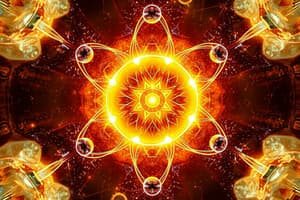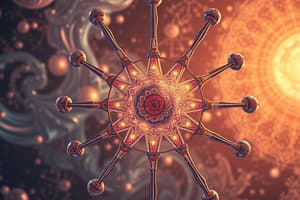Podcast
Questions and Answers
What is the composition of an atom's nucleus?
What is the composition of an atom's nucleus?
The nucleus is made up of protons and neutrons.
What is the relationship between the atomic number and the number of protons?
What is the relationship between the atomic number and the number of protons?
The atomic number is equal to the number of protons.
Define isotopes and provide an example.
Define isotopes and provide an example.
Isotopes are atoms of an element with the same number of protons but different numbers of neutrons. For example, two isotopes of chlorine are chlorine-35 and chlorine-37.
Explain the charge and location of electrons in an atom.
Explain the charge and location of electrons in an atom.
What is the mass number of an atom and how is it related to the atomic structure?
What is the mass number of an atom and how is it related to the atomic structure?
Study Notes
Atomic Structure and Isotopes
- The nucleus of an atom is composed of protons and neutrons, while electrons orbit the nucleus and have negligible weight.
- Protons carry a positive charge, neutrons are neutral, and electrons are negatively charged, creating an attraction between the nucleus and electrons.
- In a neutral atom, the number of protons is equal to the number of electrons.
- The atomic number of an atom is equal to the number of protons, which also corresponds to the number of electrons in a neutral atom.
- The mass number of an atom is the sum of the protons and neutrons in its nucleus.
- Isotopes are atoms of the same element with the same number of protons but different numbers of neutrons.
- Isotopes have the same atomic number but different mass numbers.
- An example of isotopes is chlorine-35 and chlorine-37, which have the same number of protons but different numbers of neutrons.
- Isotopes exhibit similar chemical properties due to identical numbers of protons but may have different physical properties due to varying numbers of neutrons.
- The concept of isotopes is crucial in fields such as radiometric dating, nuclear medicine, and environmental science.
- Understanding isotopes is essential in differentiating between elements and their various forms, contributing to diverse scientific applications.
- The ability to discern isotopes provides valuable insights into the behavior and characteristics of elements in different contexts.
Studying That Suits You
Use AI to generate personalized quizzes and flashcards to suit your learning preferences.
Description
Test your knowledge of atomic structure and isotopes with this quiz. Explore the composition of the nucleus, protons, neutrons, and electrons, as well as the concept of isotopes.



